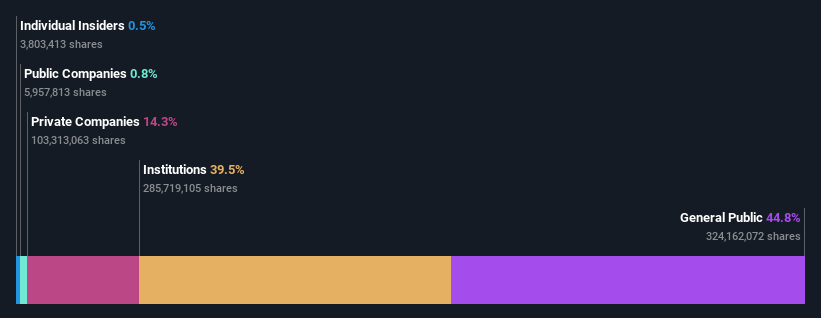Institutions own 40% of Charter Hall Long WALE REIT (ASX:CLW) shares but retail investors control 45% of the company
Key Insights
Significant control over Charter Hall Long WALE REIT by retail investors implies that the general public has more power to influence management and governance-related decisions
A total of 17 investors have a majority stake in the company with 50% ownership
Institutional ownership in Charter Hall Long WALE REIT is 40%
If you want to know who really controls Charter Hall Long WALE REIT (ASX:CLW), then you'll have to look at the makeup of its share registry. We can see that retail investors own the lion's share in the company with 45% ownership. Put another way, the group faces the maximum upside potential (or downside risk).
And institutions on the other hand have a 40% ownership in the company. Generally speaking, as a company grows, institutions will increase their ownership. Conversely, insiders often decrease their ownership over time.
In the chart below, we zoom in on the different ownership groups of Charter Hall Long WALE REIT.
View our latest analysis for Charter Hall Long WALE REIT
What Does The Institutional Ownership Tell Us About Charter Hall Long WALE REIT?
Many institutions measure their performance against an index that approximates the local market. So they usually pay more attention to companies that are included in major indices.
As you can see, institutional investors have a fair amount of stake in Charter Hall Long WALE REIT. This suggests some credibility amongst professional investors. But we can't rely on that fact alone since institutions make bad investments sometimes, just like everyone does. If multiple institutions change their view on a stock at the same time, you could see the share price drop fast. It's therefore worth looking at Charter Hall Long WALE REIT's earnings history below. Of course, the future is what really matters.
Hedge funds don't have many shares in Charter Hall Long WALE REIT. Trust Company Limited is currently the company's largest shareholder with 11% of shares outstanding. For context, the second largest shareholder holds about 11% of the shares outstanding, followed by an ownership of 8.7% by the third-largest shareholder.
A closer look at our ownership figures suggests that the top 17 shareholders have a combined ownership of 50% implying that no single shareholder has a majority.
While studying institutional ownership for a company can add value to your research, it is also a good practice to research analyst recommendations to get a deeper understand of a stock's expected performance. There are a reasonable number of analysts covering the stock, so it might be useful to find out their aggregate view on the future.
Insider Ownership Of Charter Hall Long WALE REIT
The definition of an insider can differ slightly between different countries, but members of the board of directors always count. The company management answer to the board and the latter should represent the interests of shareholders. Notably, sometimes top-level managers are on the board themselves.
Most consider insider ownership a positive because it can indicate the board is well aligned with other shareholders. However, on some occasions too much power is concentrated within this group.
Our most recent data indicates that insiders own less than 1% of Charter Hall Long WALE REIT. However, it's possible that insiders might have an indirect interest through a more complex structure. Keep in mind that it's a big company, and the insiders own AU$13m worth of shares. The absolute value might be more important than the proportional share. Arguably, recent buying and selling is just as important to consider. You can click here to see if insiders have been buying or selling.
General Public Ownership
The general public-- including retail investors -- own 45% stake in the company, and hence can't easily be ignored. This size of ownership, while considerable, may not be enough to change company policy if the decision is not in sync with other large shareholders.
Private Company Ownership
We can see that Private Companies own 14%, of the shares on issue. It might be worth looking deeper into this. If related parties, such as insiders, have an interest in one of these private companies, that should be disclosed in the annual report. Private companies may also have a strategic interest in the company.
Next Steps:
It's always worth thinking about the different groups who own shares in a company. But to understand Charter Hall Long WALE REIT better, we need to consider many other factors. Be aware that Charter Hall Long WALE REIT is showing 2 warning signs in our investment analysis , you should know about...
If you would prefer discover what analysts are predicting in terms of future growth, do not miss this free report on analyst forecasts.
NB: Figures in this article are calculated using data from the last twelve months, which refer to the 12-month period ending on the last date of the month the financial statement is dated. This may not be consistent with full year annual report figures.
Have feedback on this article? Concerned about the content? Get in touch with us directly. Alternatively, email editorial-team (at) simplywallst.com.
This article by Simply Wall St is general in nature. We provide commentary based on historical data and analyst forecasts only using an unbiased methodology and our articles are not intended to be financial advice. It does not constitute a recommendation to buy or sell any stock, and does not take account of your objectives, or your financial situation. We aim to bring you long-term focused analysis driven by fundamental data. Note that our analysis may not factor in the latest price-sensitive company announcements or qualitative material. Simply Wall St has no position in any stocks mentioned.

 Yahoo Finance
Yahoo Finance 

